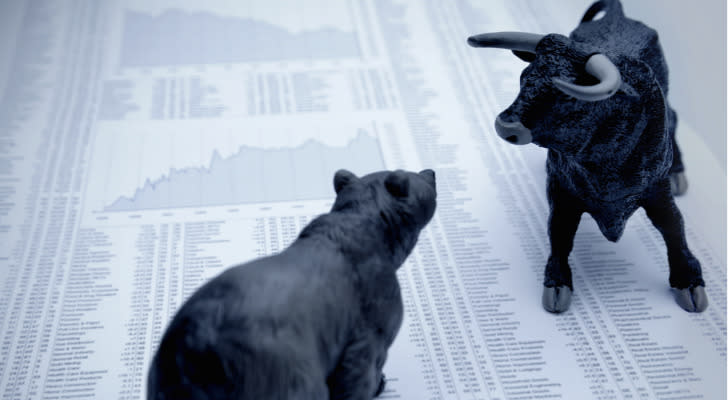What’s a Bullish Stock and When Should You Buy?

Like many industries, the financial sector has its own lingo that insiders use, which can sometimes be a bit confusing to those who aren’t familiar with it. One bit of investing jargon that even folks who’ve never stepped onto a trading floor might have heard of is the idea of “bears and bulls” being used to describe stocks or other investments. In short, a bear stock or market is one investors believe will be going down in value or underperforming. On the other hand, a bull stock or market is one investors believe will be going up or outperforming. For help with choosing stocks or other investments, consider working with a financial advisor.
What Does Bullish and Bearish Mean With Stocks?
As noted above, the definitions of bearish and bullish are simple, at least on the surface. A bullish stock is one that investors believe is going to go up in value or outperform its benchmark. For instance, let’s say you’re watching the financial news and a pundit says that she is “bullish on Company XYZ.” This means that that particular analyst believes that shares of Company XYZ are about to grow, potentially resulting in big gains in value for shareholders.
Bearish, on the other hand, means the exact opposite. If an analyst or investor is bearish on a stock, they think the share price will be going down or underperforming its benchmark. If a newspaper article mentions that traders have been “bearish on shares of ABC Cloud Services,” that means investing professionals think ABC Cloud Services is due for a rough patch, likely meaning the values of shares will soon be going down.
The two terms can also be used to describe the stock market as a whole. If you hear someone say that we are in a “bear market,” that means the expectation is that stock values will be going down across the board. A “bull market” instead means the expectation is that stock values will be going up.
Someone can also describe themselves as bullish or bearish on a certain sector of the market. If you’re bullish on pharmaceuticals, that means you think the pharmaceutical industry as a whole is entering a period of growth and stocks in that industry will be going up soon.
What to Do With Bullish and Bearish Stocks

Now that you know what bullish and bearish means, the question is what you do with that information. There are plenty of complexities of investing, but there are a few basic rules that you can trust to guide you.
If investors and analysts are bearish on a stock, it means experts expect it to lose value. If you see this analysis coming from sources you trust, there are a few things you can do. For owners of the stock, it might be time to sell. Remember, “buy low, sell high” is the most basic goal of investing, so if a stock is about to lose a huge amount of value, now may be the time to dump it. This is especially true if it’s currently sitting at a higher value than you bought it for.
If you don’t own the stock, shorting it may be a strong option. Shorting is a somewhat complex financial maneuver investors use when they believe a stock is going to lose value. If you aren’t comfortable pulling off a short sale by yourself, a financial advisor or broker can help you.
If analysts are bullish on a stock, though, that’s a sign that you should consider holding onto it for the time being, or perhaps buy even more. If you aren’t invested in a company that analysts you trust are bullish on, now might be the time to get in on it, right before the value rises.
Bottom Line

A bullish stock is one that experts and investors think is about to outperform and potentially increase in value. It makes a good investment if you get in before that price increase takes hold. A bearish stock is one that the experts think is going to underperform and go down in value. These are stocks you may want to sell off before the price goes down or potentially short sell, if you feel confident enough.
When you suspect a bear market is coming, it might be the time to pull back on equities and invest in other securities, such as bonds or commodities. A bull market, on the flip side, is the perfect time to get into the stock game, as you could see value for your purchases relatively quickly.
Investing Tips
For help understanding the stock market and other investing terms, consider working with a financial advisor. Finding a financial advisor doesn’t have to be hard. SmartAsset’s free tool connects you with up to three financial advisors in your area in five minutes. If you’re ready to be matched with local advisors, get started now.
If you make moves based on a bear or bull market, make sure to see how your sales or purchases impact your asset allocation and make more tweaks if needed.
Photo credit: ©iStock.com/Orientfootage, ©iStock.com/guvendemir, ©iStock.com/GlobalStock
The post What’s a Bullish Stock and When Should You Buy? appeared first on SmartAsset Blog.

